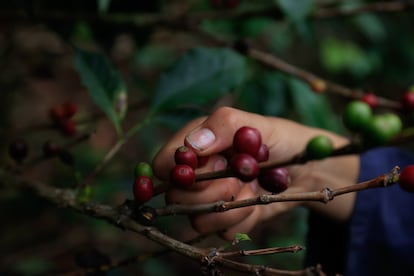The rise of coffee and gold prices: A blessing and a curse for Colombia
The bullish cycle boosts Colombia’s investment and exports, but also highlights the risks of volatility

The price of coffee recently reached its highest level in more than half a century on the New York Stock Exchange. On November 22, the price of a pound of coffee surpassed $3. Meanwhile, the price of an ounce of gold has surged by 40% over the past year. These developments have led experts in Colombia — whose economy has long depended on the export of raw materials — to question how long this favorable cycle will last. While these products lack the economic clout of oil, they note that in the face of ongoing economic difficulties, any windfall that stimulates the flow of international currency can bring benefits.
The longstanding debate about the risks of an economy dependent on the volatility of commodity markets has resurfaced. Colombian President Gustavo Petro has frequently raised this issue since his presidential campaign. As a solution, he proposed a policy to revive the industrial sector. Yet, more than halfway through his term, there has been little visible progress on this plan. Meanwhile, in 2022 and part of 2023, the strong performance of oil prices — at one point reaching nearly $123 a barrel — provided a much-needed respite for the finances of Ecopetrol, the state-majority-owned oil company, and a key player in Colombia’s public finances.
The causes and effects behind these price fluctuations vary depending on the product. Climate-related factors are at the heart of the coffee price spike, while the rise in gold prices is tied to a global movement of capital seeking safe-haven assets in response to geopolitical instability. “This trend is largely driven by the return of Donald Trump,” explains economist Adrián Garlati. He refers to the U.S. president-elect’s announcements about new tariffs and inflation, which, in his view, is not declining as expected. “When there’s uncertainty, investors turn to gold,” he adds. So do central banks around the world, accumulating gold reserves as a safeguard against potential crises.
Colombia ranks 20th in the world for gold exports, according to the financial newspaper La República. Meanwhile, the Colombian Mining Association places the country in 16th place, according to El Colombiano. This helps explain the effects of the global price surge, which has intensified over the past year. The international gold boom is stimulating growth in Colombia’s mining and quarrying sectors, but it also brings unwanted consequences. “The social effects of the increase in the price of gold have repercussions, demonstrated in articles, on child labor,” says Hernando Zuleta, dean of Economics at Universidad de los Andes.
To the challenges faced by any market that operates, to a large extent, under the shadow of illegality, Zuleta adds other concerns: “When the price of gold rises, extraction work in the mines increases. But so do school dropout rates, and there is a movement of students toward informal mining.” For the academic, the short-term gold rush can create “poverty traps.” A different story is unfolding in the coffee sector, where the rise in prices has been particularly influenced by climate effects on Brazilian crops, the world’s largest producer.
“The combination of prolonged drought and untimely frost in Brazil was the perfect storm, and was what pushed the market to the third-highest price level in New York’s history,” explains commodities expert Albert Scalla from Miami. He adds that the European Green Deal, a package of new restrictions and environmental requirements for coffee growers, has also had an impact: “We expect a lot of volatility in the coming months. We must keep an eye on the outcome of the Vietnam harvest, which takes place around that time.”
Adrián Garlati welcomes the benefits for coffee producers, but points out that agricultural cycles are limited: “This is a reality for this year. I believe that by next year, everything will return to normal. In any case, coffee’s importance to the Colombian economy is far less than that of oil, gas, or mining.” The truth is that coffee growing has been one of the main drivers of GDP growth in 2024. While the agricultural sector as a whole, alongside the arts, has helped propel global results, coffee has been the protagonist, with a 33.6% quarterly growth in the most recent interannual comparison.
The coffee industry is also better equipped than the gold industry to handle the social effects of a price boom. It has more wage-earning farmers and there is no illegal coffee cultivation. Its issues with desertion are linked to generational changes among farmers and migration to the cities. According to University of Rosario professor Alejandro Useche, however, there are other downsides to this price surge: “When prices rise, they can attract investments in fixed assets. But an export model that depends structurally on such prices is risky because it is subject to high volatility and uncertainty.”
This is part of a long-standing debate that resurfaces periodically and often ends with calls for action. As Stanford University academic Javier Mejía observes, Colombia has yet to find an export matrix based on higher value-added activities. The country is still searching for a formula that will allow it to maintain prosperity without relying on raw materials. Garlati recalls that the potential of sectors like tourism and agro-industry has been discussed, but he concludes: “Many other conditions must be in place for these strategic niches to develop, for there to be investment and growth. And now, with the push for an energy transition to low-carbon economies, the real discussion will be about defining which are the strategic sectors for the country.”
Sign up for our weekly newsletter to get more English-language news coverage from EL PAÍS USA Edition
Tu suscripción se está usando en otro dispositivo
¿Quieres añadir otro usuario a tu suscripción?
Si continúas leyendo en este dispositivo, no se podrá leer en el otro.
FlechaTu suscripción se está usando en otro dispositivo y solo puedes acceder a EL PAÍS desde un dispositivo a la vez.
Si quieres compartir tu cuenta, cambia tu suscripción a la modalidad Premium, así podrás añadir otro usuario. Cada uno accederá con su propia cuenta de email, lo que os permitirá personalizar vuestra experiencia en EL PAÍS.
¿Tienes una suscripción de empresa? Accede aquí para contratar más cuentas.
En el caso de no saber quién está usando tu cuenta, te recomendamos cambiar tu contraseña aquí.
Si decides continuar compartiendo tu cuenta, este mensaje se mostrará en tu dispositivo y en el de la otra persona que está usando tu cuenta de forma indefinida, afectando a tu experiencia de lectura. Puedes consultar aquí los términos y condiciones de la suscripción digital.









































